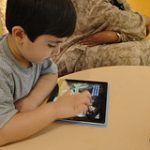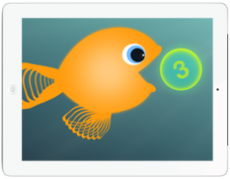 For the second year in a row, the iPad is the most popular item that children are asking for as a holiday gift. Given that it is the season for making wish-lists, it is in this spirit that I offer my own iPad research wish-list for 2012. The items on this list will surely keep a variety of researchers busy in the new year and would help address some critical questions about the iPad in particular, but touch screens in general. Given that there are 8 days of Chanukah & 12 days of Christmas, I offer 10 items with a standard deviation of 2 (as a compromise) on my work related wish-list.
For the second year in a row, the iPad is the most popular item that children are asking for as a holiday gift. Given that it is the season for making wish-lists, it is in this spirit that I offer my own iPad research wish-list for 2012. The items on this list will surely keep a variety of researchers busy in the new year and would help address some critical questions about the iPad in particular, but touch screens in general. Given that there are 8 days of Chanukah & 12 days of Christmas, I offer 10 items with a standard deviation of 2 (as a compromise) on my work related wish-list.
1) I wish we had better data on whether using touch screen supports spatial relations and other cognitive functions as we’ve learned that other videogames can sometimes do. Does it really matter if a child is using a joystick or a finger to do a particular task? Do joystick maneuvers help develop skills finger sliding doesn’t or just different skills? It’s clear from our research that children have a much easier time manipulating items on a touch-screen than a mouse. Is a touch screen like driving an automatic and a computer mouse more of a stick shift?
2) I wish I knew more about what activities touch screen experiences are displacing and whether those alternative experiences are generally more enriching than what children do on touchscreens. One of the early arguments against television was that time with TV displaced other creative or educational activities in the home that would be better for learning. The actual research suggests that not to generally be the case when it comes to educational television viewing. That is, those who experience educational television are also more likely to be engaged in other educational experiences such as reading. Might the same thing be true for touchscreen use?
3) I wish I knew how to increase interactions between parents and children around touchscreen technologies. From our own observations and conversations with experts in the field, it is clear that we could do more to increase conversations around games and e-books, but the actual implementation of how we do that is still a bit hazy. Is there any experimental data on this?
4) I wish somebody would fund some research around touch screen technologies ability to improve executive functioning. Do children persist more around games/tasks that are on the iPad or other touch screen technology compared to computers because they are new and different? What about compared to real life games? If there is a difference now, will that change as touch screens become more commonplace and less “cool?”
5) I wish I knew whether or not we could legitimately use interactive technologies, mobile technologies, and touch screen technologies interchangeably when we’re talking about the influence of interactive technology on children’s learning. Does the medium matter for learning assuming the general content is the same? Does the size of the screen matter?
6) I wish someone could send me an empirically based research summary of best practices on the technical features (or formal features) of e-books and digital games. For example, when using an art-tool in an iPad games for 3 year olds, should there be auto-fill feature when a child fills in 75% of the item that the whole item becomes filled in? Should it automatically fill-in before that? Not fill in at all? Would filling it in reduce frustration? Or would it be rewarding a child for non-completion?
7) I wish I could confidently answer my sister when she asks whether doing art or something else exploratory or freestyle, is just as effective for motor development and creativity as it would be drawing with real crayons and paper and finger painting.
8) I wish there were more research studies around the use of iPads or other individualized portable devices to help individualize experiences that are tailored to a child’s readiness level during the preschool years. Would this practice have promising effects even for the youngest children? And what about technology portability nature makes the iPad or other touchscreens particularly useful for assessment?
9) I wish there wasn’t a digital divide and I wish more people had access to the wonderful opportunities touch screen devices may afford. This assumes, of course, that these touch screen devices do all sorts of great things for the world. Good content can provide a whole host of cognitive and social benefits (what did I do before bejeweled came into my life?) but there’s not enough empirical evidence about the effectiveness of new touch screens on learning.
10) And finally, I wish I could be even half as skilled as my niece (7) and nephew (4) on “Cut the Rope.”
Happy Holidays to all of you!
Jennifer Kotler is the Vice President of Domestic Research at Sesame Workshop. She holds a PhD in Child Development from the University of Texas at Austin.




